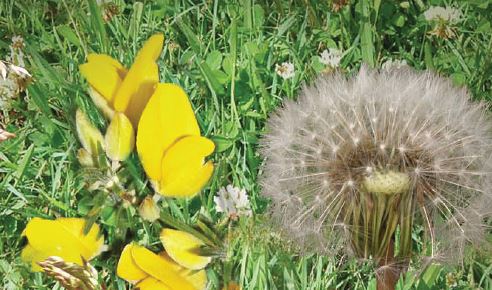Learn How to Identify and Control Weeds
 This course provides valuable learning for land managers, farmers, gardeners, orchardists, market gardeners, landscapers, spray contractors, nurserymen or anyone else concerned with the control of weeds.
This course provides valuable learning for land managers, farmers, gardeners, orchardists, market gardeners, landscapers, spray contractors, nurserymen or anyone else concerned with the control of weeds.
COURSE STRUCTURE AND CONTENT
Course Duration: 100 hours.
Start Date: Start at any time - study at a pace that suits you, and with full tutor support for the duration of your studies.
COURSE STRUCTURE
The course is divided into 7 lessons as follows:
1. Weed Identification
- Review of the system of plant identification
- Common groups of weeds
- General characteristics of the weeds
- Resource guide
2. Weed Control Methods
- Different ways to control weeds
- Types of weed problems
- List of plants to avoid
- Profile of some common weeds
- Mulching
- Soil treatments to control plant problems
- Physiological effects of weedicides on plants
- Pesticides terminology
3. Chemical Weed Control
- Review of commercial groups of herbicides and their use
- Weedicides for home gardens
4. Weed Control In Specific Situations
- Methods of controlling weeds on turf
- Types of weedicides used
- The law in relation to chemical use
- Commonly used commercial formulations
- Weed control in plant nurseries
5. Safe Chemical Application
- Safety rules for using chemicals
- Safely storing and mixing of chemicals
- Correct usage of chemicals
- Cleaning up and disposing chemicals
- Basic first aid in relation to chemicals
- Keeping records of chemical usage
- Selection of pump and tanks
- Sprayer maintenance and cleaning
- Effects of chemicals on humans and animals
6. Non-Chemical Weed Control
- Effects of chemical herbicides on the environment
- Biocontrol of pests and diseases
- Advantage and disadvantage of biocontrol
7. Developing A Major Weed Control Program
- A practical lesson where the student can fully demonstrate their understanding of weed control by devising a weed management plan for a designated area.
LEARNING AIMS
- Distinguish between different types of weeds, and identify common weed species, growing in your locality.
- Explain the characteristics of different weed control methods.
- Explain the use of chemical herbicides to control weeds.
- Specify appropriate weed control methods, for different types of situations.
- Determine appropriate techniques for the safe application of chemical herbicide in a specific situation.
- Explain different non-chemical weed control methods.
- Devise appropriate methods for control of weeds, for specific problems, in both the horticultural and agricultural industries
- Determine a detailed weed control program for a significant weed problem.
EXAMPLES OF WHAT YOU MAY DO IN THIS COURSE
- Observe and consider over 100 different varieties of weeds and prepare plant review sheets for different weed plants.
- Make up a list of information resources.
- Plant, grow and observe different varieties of weeds.
make drawings of young seedlings of at least fifteen different weeds.
- Interview people who have to deal with weed control in their daily life.
- Visit a nursery, garden shop or hardware store that sells herbicides to the public.
- Visit at least one supplier of herbicides for industrial and agricultural use.
- Contact larger chemical companies for leaflets on different herbicides.
- Investigate at least two workplaces where weed control programs are regularly carried out.
- Visit and inspect different sites where weeds are a problem.
- Photograph different places that have been treated with weedicides.
- Contact your local Department of Agriculture or Lands Department for researching purposes.
- Visit several farmers who raise different types of livestock.
- Develop a 12 month guideline for an integrated weed control program for a particular site.
HOW THE COURSE WORKS
You can start the Weed Control course at any time.
It is studied by distance learning, so you can study in the comfort of your own home. But this doesn't mean you are all alone in your studies. Our highly qualified and friendly tutors are there to help you every step of the way. If you have any questions at all, they are always happy to help.
Each lesson includes set tasks, and is completed with an assignment which the student submits to their course tutor. The tutor will mark the assignment and return this to the student with comments and suggestions for further reading.
WHY CHOOSE ACS?
- Our courses are written and taught by experienced professionals, so you know you can expect a high quality of teaching and support.
- You can start the course at any time and study at your own pace.
- Fit your studies around your own busy lifestyle - we provide full tutor support for all the time you are studying.
- Study where you want to - online studies offer the flexibility for you to determine where and when you study.
Sample Course Notes - How Weedicides Work
 There are a number of ways in which weedicides act on plants. Examples of these include:
There are a number of ways in which weedicides act on plants. Examples of these include:
Disruption of Cellular Membranes
These are fast acting weedicides, causing the cells of the plant to rupture, similar to what naturally occurs during a heavy frost. As the cells have been affected, they cannot continue to function properly, and die quickly. Weedicides that function this way include Paraquat, Diquat and petroleum oil based weedicides.
Auxin Effect
auxin is a growth hormone, and in the case of these types of weedicides, they cause the plant to grow very quickly. The rate of growth causes the plant to become distorted and eventually to die, usually in about 14 days. Depending on the type of chemical used, the growth can occur in either the leaves or the roots of the plant. Weedicides that function this way include 2,4-D and Modown.
Metabolic
These weedicides affect the metabolism of the plant. Some types promote the plants metabolism, causing it to grow quickly and as a result, causing other natural functions of the plant to slow down. (It is different from the Auxin effect, which promotes growth to distort the plant. The quick growth with metabolic chemicals allows the chemical to attack and slow down other growth functions). Some types of metabolic weedicides inhibit the functions of the plant, without causing any quick growth. Some inhibit protein synthesis or root growth, while others inhibit the plant growth. Weedicides that function through metabolic means include arsenic based types, Roundup, Carbyne and Sutan.
Photosynthesis
These weedicides act on the plant's ability to photosynthesize. Weedicides that function this way include Lorox, Sencor, Probe and Weedazol.
Not all weedicides work on all types of plants. The chemical structure of the weedicide changes when it makes contact with the plant. Some plants can inactivate a weedicide and therefore are not affected by it. Other plants will absorb or react to the weedicide, causing the plant to die. This is the reason why some chemicals are selective in what they will kill and others are non-selective.
Why Study This Course?
This course is suitable for anyone who needs to know more about weed control. For example -
- keen amateurs and professionals
- gardeners
- landscapers
- garden designers
- permaculture experts
- farmers and farm workers
- park managers
- urban maintenance workers
The course is useful for anyone wanting to improve and update their knowledge of weed control for personal interest or to boost their job and career prospects.
You can study the course online or by distance learning. The course is self-paced. We do not set deadlines. You can also study from anywhere in the world.
Your tutor is there to support you throughout the course. They will mark the assignment at the end of each lesson and you can also contact them with any questions at all about the course.
Any Questions?
Our weed control tutors are happy to answer any questions -